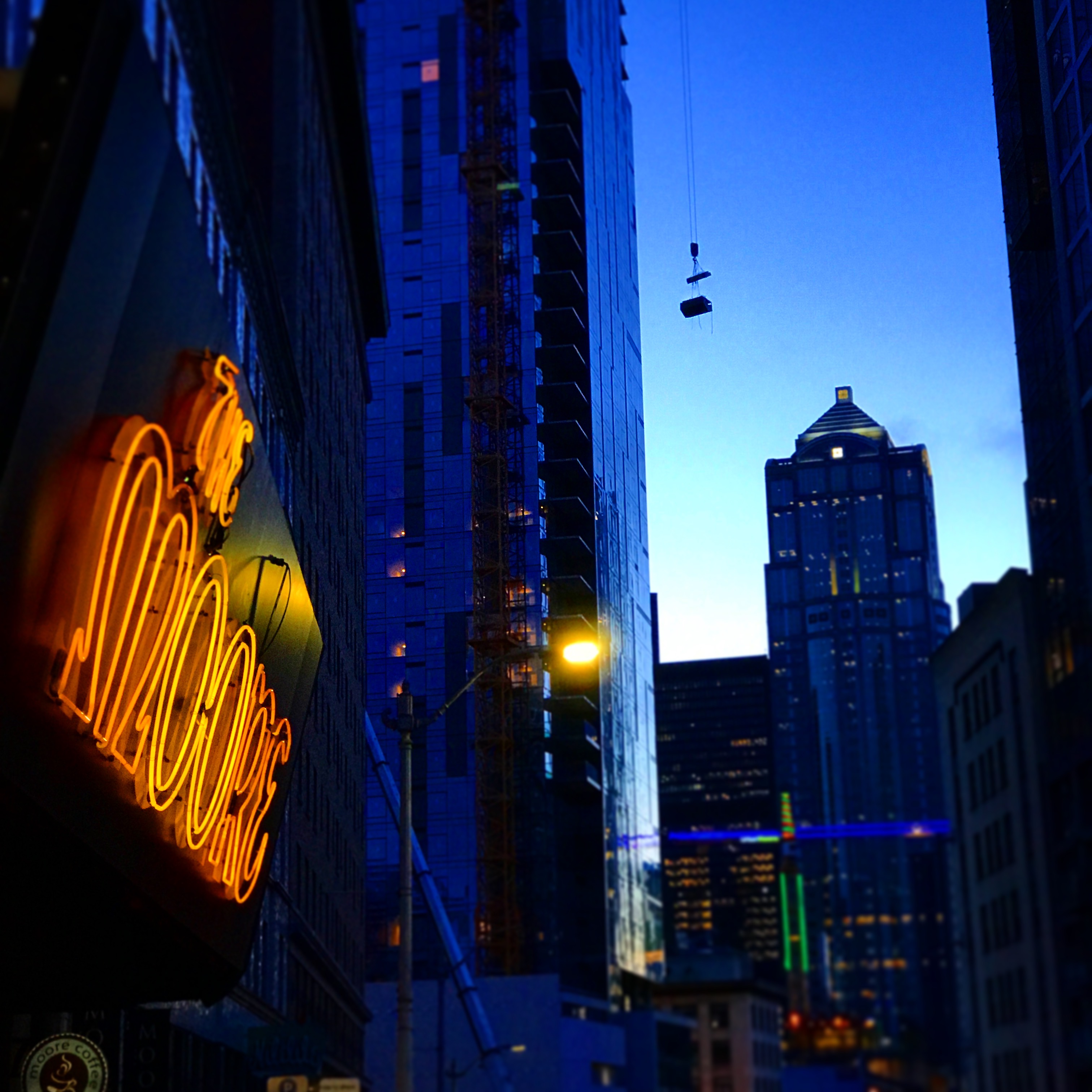Seattle Writing Prompts: More Moore
Seattle Writing Prompts are intended to spark ideas for your writing, based on locations and stories of Seattle. Write something inspired by a prompt? Send it to us! We're looking to publish writing sparked by prompts.

Theaters have a special place in the history of cities. It's more than memory, although I've certainly seen some notable performances at the Moore Theater over the years (odds are pretty good you have as well). Theaters take up a huge amount of space on the grid, but are only lit up with activity and people a few hours a day, at best. The rest of the time they lay in wait, a few people prepping, practicing, staging, or constructing, but otherwise, they're empty.
During the day, the gates across the front entrance may be slightly cracked, and you wonder who is inside. Perhaps you catch the person changing the letters on the marquee. Perhaps you think you hear sound check leaking out. Perhaps you see the tour buses, the sides popped out to allow for more sleeping space, parked in front or on Virginia between 2nd and 3rd.
The Moore is the oldest still-active theater in Seattle. About half the capacity of the grander Paramount across town, the theater feels both grand and tiny when full and a performer is on stage. You can see the expressions on their faces, the intimacy is something amazing.
It opened in 1907, which means as its doors were first thrown wide, just north workers were still sluicing away parts of Denny Hill, in the second regrade effort. The Moore's purpose was to house (in the adjoining hotel) and entertain visitors of the Alaska-Yukon-Pacific Exposition, a grand world's fair in 1907 (we all know what the fair grounds of the 1962 world's fair became, so what became of the grounds of the Alaska-Yukon-Pacific Exposition? They became the University of Washington campus).
For many years the Moore was a movie palace, and under the name Moore Egyptian it hosted the first SIFF festival in 1976, before the folks that ran it moved the theater to the old Masonic Temple on Capitol Hill, and kept the Egyptian name.
The Moore has a second balcony, that has a separate entrance off Virginia, which bypasses the grand lobby, and offers more modest bathrooms. Speculation is that this was for racially segregating theater goers, but historians have not been able to uncover definitive proof. Other speculation is that the balcony was for economic segregation, which was defacto racial segregation as well. Feliks Banel wrote a great piece on this that was published on My Northwest.
Now, isn't that enough to give us some ideas to write about?
Today's prompts
- The theater is dark. A match strikes and flares, a candle is lit. A quavering hand walks it across a bare stage, one shy step after another, all the way to the front. The candle is placed, ever-so-carefully in front of its bearer, who clears their throat, and addresses the supposedly empty theater with something they've wanted to do in public their entire life.
- The theater is bustling, and outside the door on Virginia, trying to hustle a fifty-cent ticket to the high balcony, is our hero. There's a Vaudeville act coming through they keep hearing about, and they're gonna see it no matter what may come. The ticket acquired, they hop the stairs two at a time to get in, and grab an empty place on a wooden bench up front. But when the first act rolls out, they see that rich fellow who did them wrong, sitting right down there on the floor. Nothing — and I mean nothing — is gonna stop them taking their revenge.
- The theater is about to riot. The crowd is sick of waiting. They're booing, throwing illicitly imported bottles at the empty stage. The stage manager goes once more to try to convince the band, now an hour late, to get a move on. They're doing lines and gulping whiskey in the dressing room. But at the sight of the stage manager, they decide it's time. "Fucking singer been gone a long time" one of them says, and another goes over to knock on the toilet door. It opens. There is the singer, slouched on the toilet, needle in arm.
- The theater is rented for the afternoon. There's a single mic on stage, and only twenty-five people in the audience. Nobody can believe they got this lucky, especially that person sitting right in the middle, who is holding an envelope from the DNA testing firm that conclusively proves that the man about to walk out onto the stage is, in fact, their father.
- The theater is closing. Who goes out anymore? Everything is virtual reality now. Every seat is front row. You could sit on the damn stage if you want, and feel it when your favorite musician walks over to you and kisses you. But there's one more night to get over first, and it's gonna suck. Touring asshole comedian, the house not even half sold. But then, in a standard security sweeping, someone finds a duffel bag tucked under a seat. And inside, it sure looks like a bomb.